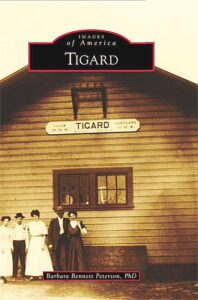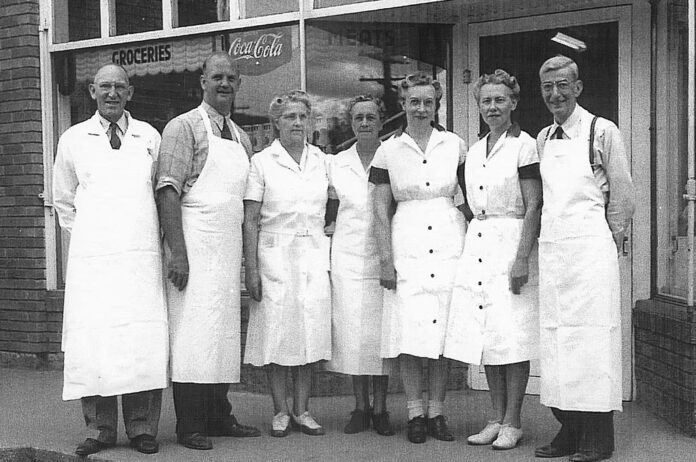
August (Gus) Schubring and his relative Wilbur G. Biederman ran a local institution, the grocery store, on Tigard’s Main Street in Old Town from c. 1922 to 1950.
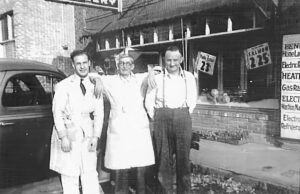
August Schubring had been born in Sioux City, Wisconsin, in 1880 and had moved as a youth with his family to Madison where he had worked in a brother’s grocery store in his early twenties. After gaining work experience, Gus Schubring ventured to Yonkers, New York where he worked on the waterfront. Seeking new adventures and a livelihood farther west, Schubring traveled to Portland, Oregon where he worked for the Express Company. After saving his money he bought a small ranch east of Tigard and brought electricity to his farm, advocating that other farmers also erect poles and wires to electrify their residences.
Gus Schubring married widow Margaret Kurth Wall with a daughter, Mildred, and they would have two daughters of their own, Betty and Eva Louise. Gus Schubring diversified from farming in 1922 when he purchased a grocery business from George Boland on Tigard’s Main Street and moved his family into new living quarters above their store. The grocery business was a social institution as customers received their products from the salesperson behind the counter who took them off the shelf or measured out portions from bins and wrapped the goods. This prohibited shoplifting and customers “visited” while ordering or browsing.
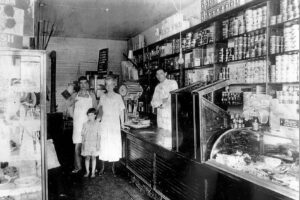
Initially Schubring had hired Mrs. Hoffman from Tualatin to assist him and then hired his relative Wilbur Biederman in 1925. Wilbur was the nephew of Nickolas Kurth, Margaret Schubring’s brother, who lived on Beef Bend Road. Wilbur had worked on his uncle’s Tigard farm during the summers and had just graduated in 1923 from Oregon Agricultural College (now OSU) and had worked briefly as a cattle tester for the government. Wilbur also had just married Coral Gavin in 1923 and they moved from Corvallis to Tigard. Wilbur Biederman worked for Gus Schubring in developing high-quality animal feed, and they formed a partnership of Schubring and Biederman, with Wilbur concentrating on the new Tigard Feed and Garden Store they opened next to the Oregon Electric Railroad station and Gus running the grocery store.
Both businesses and partners became successful, and in October of the next year, Herman Zweiner was hired as a grocery assistant. Many citizens of Tigard worked at the Schubring Biederman store such as Marvin Finley, Anna and Fred Hambach (who served as the store’s butcher), George Brelin, Alexandarina Rankin, Marie Hoefs, Pauline Miller, and Ira Branch.
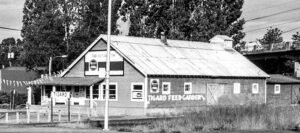
Most Tigard residents came into town and bought their groceries from the Schubring Biederman store on Main Street. It became the social center just as the former Charles F. Tigard general merchandise store had been earlier on Pacific Highway.
The grocery store burned on August 7, 1931, after a fire had erupted next door at Krueger’s Pool Hall and Barber Shop. The fire bell was rung, the fire department turned out aided by Tigard citizens who emptied the Schubring store of its goods and piled them in the street before they were later carried to the Schamoni buildings nearby. Fire brigades from Portland, Beaverton, and Newberg responded luckily to put out the fire that had threatened to burn the entire town. There was damage to the barber shop, pool hall, and telephone office in addition to the Schubring Biederman grocery store. A new brick building was raised from the ashes and the partners re-opened their store in January 1932.
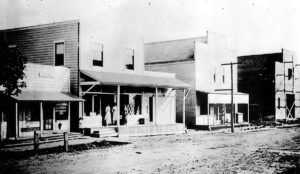
The partnership of Schubring and Biederman ended in 1936 when the Biedermans moved from Tigard to Jefferson, Wisconsin. Gus Schubring continued to run the Tigard grocery store until he sold it in 1950 and retired. His business was purchased by Tigard residents Fred Burroughs and William (Joe) O’Halloran who renamed the store the Super-Ette Market.
Post-World War II witnessed the further consolidation of small grocers into larger self-service stores using push carts. Schubring sold the Feed Store to Gray and Rasmusen, and after a series of subsequent owners, the building was donated to the Tigard Chamber of Commerce in 1954. Eventually torn down in 1997, today the Chamber of Commerce and the Symposium Coffee stand on the spot of the former feed store.
Throughout, Gus Schubring remained an upright Tigard citizen. He had been one of the original proponents of electrifying the entire town of Tigard, paving Main Street, and getting rid of the plank or dirt roads with paving for automobiles. He enjoyed being one of Tigard’s first citizens to have a telephone and was a member of the Water Board so important to parcel out irrigation water for the farmers’ use. He was fair and honest and encouraged local sports such as the local baseball team and engendered civic pride. He also served as a volunteer fireman and worked to incorporate the city of Tigard.
Gus Schubring died four months after selling his beloved store.
To become a member, volunteer, or for more information about the Tigard Historical Association visit www.tigardhistorical.org.
Dr. Barbara Bennett Peterson’s book can be found locally at Costco, Rite Aid, and the Tigard History Association’s John Tigard House Museum. You can also find it online at Amazon.com: tinyurl.com/4eym9zmt.






